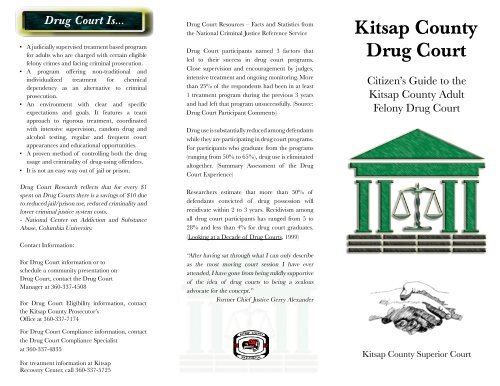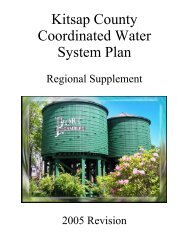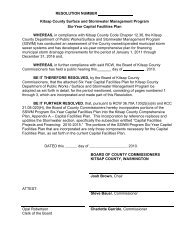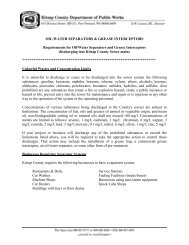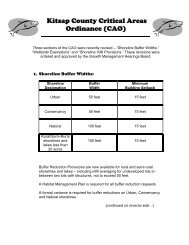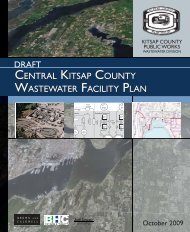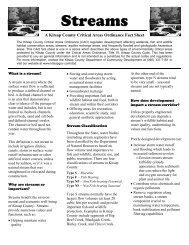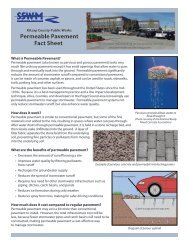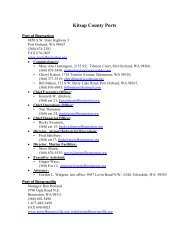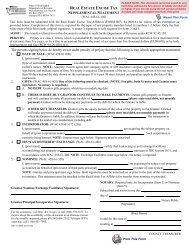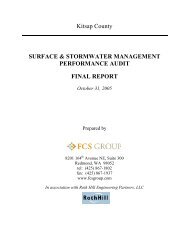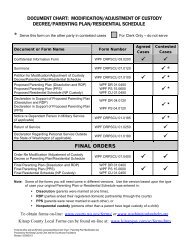Citizen Information Regarding Drug Court - Kitsap County Government
Citizen Information Regarding Drug Court - Kitsap County Government
Citizen Information Regarding Drug Court - Kitsap County Government
You also want an ePaper? Increase the reach of your titles
YUMPU automatically turns print PDFs into web optimized ePapers that Google loves.
<strong>Drug</strong> <strong>Court</strong> Is...<br />
• A judicially supervised treatment based program<br />
for adults who are charged with certain eligible<br />
felony crimes and facing criminal prosecution.<br />
• A program offering non-traditional and<br />
individualized treatment for chemical<br />
dependency as an alternative to criminal<br />
prosecution.<br />
• An environment with clear and specific<br />
expectations and goals. It features a team<br />
approach to rigorous treatment, coordinated<br />
with intensive supervision, random drug and<br />
alcohol testing, regular and frequent court<br />
appearances and educational opportunities.<br />
• A proven method of controlling both the drug<br />
usage and criminality of drug-using offenders.<br />
• It is not an easy way out of jail or prison.<br />
<strong>Drug</strong> <strong>Court</strong> Research reflects that for every $1<br />
spent on <strong>Drug</strong> <strong>Court</strong>s there is a savings of $10 due<br />
to reduced jail/prison use, reduced criminality and<br />
lower criminal justice system costs.<br />
- National Center on Addiction and Substance<br />
Abuse, Columbia University.<br />
Contact <strong>Information</strong>:<br />
For <strong>Drug</strong> <strong>Court</strong> information or to<br />
schedule a community presentation on<br />
<strong>Drug</strong> <strong>Court</strong>, contact the <strong>Drug</strong> <strong>Court</strong><br />
Manager at 360-337-4508<br />
For <strong>Drug</strong> <strong>Court</strong> Eligibility information, contact<br />
the <strong>Kitsap</strong> <strong>County</strong> Prosecutor’s<br />
Office at 360-337-7174<br />
For <strong>Drug</strong> <strong>Court</strong> Compliance information, contact<br />
the <strong>Drug</strong> <strong>Court</strong> Compliance Specialist<br />
at 360-337-4835<br />
For treatment information at <strong>Kitsap</strong><br />
Recovery Center, call 360-337-5725<br />
<strong>Drug</strong> <strong>Court</strong> Resources – Facts and Statistics from<br />
the National Criminal Justice Reference Service<br />
<strong>Drug</strong> <strong>Court</strong> participants named 3 factors that<br />
led to their success in drug court programs.<br />
Close supervision and encouragement by judges,<br />
intensive treatment and ongoing monitoring. More<br />
than 25% of the respondents had been in at least<br />
1 treatment program during the previous 3 years<br />
and had left that program unsuccessfully. (Source:<br />
<strong>Drug</strong> <strong>Court</strong> Participant Comments)<br />
<strong>Drug</strong> use is substantially reduced among defendants<br />
while they are participating in drug court programs.<br />
For participants who graduate from the programs<br />
(ranging from 50% to 65%), drug use is eliminated<br />
altogether. (Summary Assessment of the <strong>Drug</strong><br />
<strong>Court</strong> Experience)<br />
Researchers estimate that more than 50% of<br />
defendants convicted of drug possession will<br />
recidivate within 2 to 3 years. Recidivism among<br />
all drug court participants has ranged from 5 to<br />
28% and less than 4% for drug court graduates.<br />
(Looking at a Decade of <strong>Drug</strong> <strong>Court</strong>s, 1999)<br />
“After having sat through what I can only describe<br />
as the most moving court session I have ever<br />
attended, I have gone from being mildly supportive<br />
of the idea of drug courts to being a zealous<br />
advocate for the concept.”<br />
Former Chief Justice Gerry Alexander<br />
<strong>Kitsap</strong> <strong>County</strong><br />
<strong>Drug</strong> <strong>Court</strong><br />
<strong>Citizen</strong>’s Guide to the<br />
<strong>Kitsap</strong> <strong>County</strong> Adult<br />
Felony <strong>Drug</strong> <strong>Court</strong><br />
<strong>Kitsap</strong> <strong>County</strong> Superior <strong>Court</strong>
Eligibility and Suitability.<br />
<strong>Drug</strong> <strong>Court</strong><br />
Program Elements<br />
Judicially Supervised Treatment<br />
Screening for participation is a two-step process<br />
The Prosecutor is primarily responsible for<br />
determining a participant’s legal eligibility for <strong>Drug</strong><br />
<strong>Court</strong>.<br />
<strong>Drug</strong> <strong>Court</strong> is limited to defendants who<br />
• Have no conviction history of violent felony<br />
offenses<br />
• Have no history of sexual offenses<br />
• No use of firearm in current charge<br />
• Are charged with eligible offenses<br />
— <strong>Drug</strong> offenses including possession<br />
— Non-<strong>Drug</strong> offenses if drug driven<br />
Such as Forgeries, Thefts, etc.<br />
After a participant has been found eligible, he or she<br />
must be screened to determine suitability for chemical<br />
dependency treatment. The candidate must be willing to<br />
participate in treatment and education programs.<br />
Screening has two phases:<br />
• Orientation by the <strong>Drug</strong> <strong>Court</strong> Compliance<br />
Specialist with background checks.<br />
• Chemical Dependency Evaluation completed<br />
by the <strong>Drug</strong> <strong>Court</strong> Treatment Counselor to<br />
determine the level of substance dependency and<br />
likelihood of successful completion of the <strong>Drug</strong><br />
<strong>Court</strong> Program.<br />
In all phases, participants must attend 12- step<br />
meetings, chemical dependency counseling, undergo<br />
drug testing, have contact with the <strong>Drug</strong> <strong>Court</strong><br />
Compliance Officer, maintain a 12- step sponsor and<br />
attend court hearings.<br />
• PHASE I – Initiation and Stabilization<br />
The participant is expected to cease using drugs,<br />
stabilize physical health and cease criminal activity.<br />
Treatment focuses on<br />
— Compliance and Accountability<br />
— Addiction Recovery<br />
— Recognition of the Seriousness of the offense<br />
• PHASE II – Consolidation<br />
The participant is expected to remain drug-free and<br />
crime-free, stabilize social and domestic environment,<br />
develop life and job skills, address major life issues and<br />
remain in good health. Treatment focuses on<br />
— Relapse Prevention<br />
— Exploration of Strengths and<br />
Weaknesses<br />
— Lifestyle Changes and Accountability<br />
• PHASE III – Reintegration<br />
The participant continues to be expected to remain<br />
drug-free and crime-free, remain in a stable social<br />
and domestic environment, employed or ready to gain<br />
employment and be fiscally responsible. Treatment<br />
focuses on<br />
— Maintenance of a Personal Recovery<br />
Plan<br />
— Vocational Training or Education<br />
— Accountability<br />
• PHASE IV – Aftercare<br />
Participants are expected to remain drug-free and<br />
crime-free, remain in a stable social and domestic<br />
environment, be employed or in an educational<br />
program and be financially responsible. Components<br />
include<br />
— Continued maintenance of a personal recovery plan<br />
— Continued maintenance of employment, education<br />
or volunteer service<br />
— Giving back to the community by way of Mentorship<br />
and/or Recovery Service work<br />
The Washington State Methamphetamine Initiative<br />
A partnership of law enforcement, treatment and<br />
prevention groups, lawmakers and community<br />
organizers - is one of the premiere anti-meth programs<br />
in the country.<br />
The initiative began as the deadly methamphetamine<br />
plague swept across the state in the late 1990’s. In<br />
2000, the founders identified all stakeholders in the<br />
meth problem and gave each a seat at the table.<br />
Since its founding, the initiative has provided<br />
training and assistance to hardened law enforcement<br />
personnel as well as vulnerable school students.<br />
<strong>Drug</strong> <strong>Court</strong> Commencement<br />
Successful completion of the <strong>Drug</strong> <strong>Court</strong> Program<br />
is recognized by a Commencement ceremony. Guest<br />
speakers acknowledge the efficacy of the program and<br />
the success of the participant. Graduation certificates are<br />
awarded and the original criminal charge(s) against the<br />
participant are dismissed.<br />
<strong>Drug</strong> <strong>Court</strong> Termination<br />
Failure of a participant to abide by the <strong>Drug</strong> <strong>Court</strong><br />
requirements results in termination from the program.<br />
There is no trial. The record is read, finding is made and<br />
sentencing occurs immediately.


